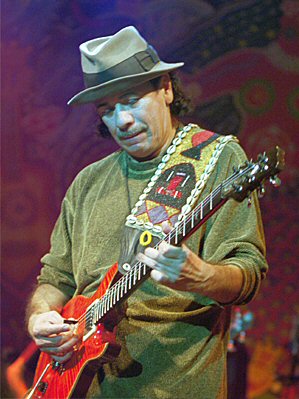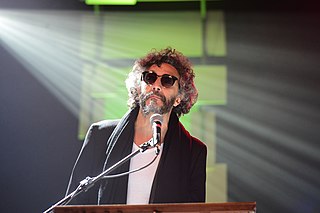Related Research Articles

Fiel a La Vega is a Rock en Español band from Puerto Rico formed in 1994. The band consisted of members Tito Auger and Ricky Laureano, who come from the northern city of Vega Alta, Puerto Rico, along with brothers Pedro and Jorge Arraiza, who come from the neighboring city of Vega Baja. Their hometown is what gave name to the band. Since 1996, they were joined by percussionist Papo Román, who left the band in 2006 to spend time with his family.
Chilean music refers to all kinds of music developed in Chile, or by Chileans in other countries, from the arrival of the Spanish conquistadors to the modern day. It also includes the native pre-Columbian music from what is today Chilean territory.

Inti-Illimani are an instrumental and vocal Latin American folk music ensemble from Chile. The band was formed in 1967 by a group of university students and it acquired widespread popularity in Chile for their song Venceremos, which became the anthem of the Popular Unity government of Salvador Allende. At the moment of the 11 September, 1973 Chilean coup they were on tour in Europe and were unable to return to their country where their music was proscribed by the ruling military junta of Augusto Pinochet. In Europe their music took on a multifarious character, incorporating elements of European baroque and other traditional music forms to their rich and colourful Latin American rhythms, so creating a distinctive fusion of modern world music. They are perhaps the best internationally known members of the Nueva canción movement. Their name means 'Sun of the Illimani': Illimani, in Aymara language, is the name of a mountain in the Bolivian Andes and it means 'Golden Eagle'.

Babasónicos is an Argentine rock band, formed in the early 1990s along with others such as Peligrosos Gorriones and Los Brujos. After emerging in the wave of Argentine New Rock bands of the late 1980s and early 1990s, Babasonicos became one of the banner groups of the "sonic" underground rock movement in Argentina in the late 1990s.

Mexican rock music, often referred to in Mexico as rock nacional, originated in the 1950s. Standards by The Beatles, Elvis Presley, The Everly Brothers, Nancy Sinatra, and Chuck Berry were soon covered by bands such as Los Apson, Los Teen Tops, Los Twisters, Los Hitters, Los Nómadas, Los Rockets, Los Rebeldes del Rock, Los Locos del Ritmo, Los Crazy Boys, and Javier Bátiz, which later led to original compositions, often in English. The group "Los Nómadas" was the first racially integrated band of the 1950s. Their lead guitarist, Bill Aken, wrote most of their original material, including the raucous Donde-Donde, and co-wrote the material for their Sounds Of The Barrio album, which is still being sold. Their 1954 recording of She's My Babe was the first top 40 R&B recording by a Latino band. In the southwestern United States, Spanish guitar rhythms and Mexican musical influences may have inspired some of the music of American musicians Ritchie Valens, Danny Flores, Sam the Sham, Roy Orbison, and later, Herb Alpert. Initially, the public exhibited only moderate interest in them, because the media attention was focused on La Ola Inglesa.
Chilean rock is rock music and its corresponding subgenres produced in Chile or by Chileans. Chilean rock lyrics are usually sung in Spanish so can be considered as part of rock en español, although sometimes are sung in English as well.
Argentine rock is rock music composed or performed by Argentine bands or artists mostly in Spanish.

Rodolfo Páez Ávalos, popularly known as Fito Páez, is an Argentine popular rock and roll musician and filmmaker.

Los Prisioneros were a Chilean rock/pop band formed in San Miguel, Santiago, in 1983. They are considered one of the most important Chilean bands, and one of the strongest musical influences that Chile has made to Latin American music. In addition, they are considered pioneers of Rock en español by Latin American media and musicians, and the band with strongest socio-political impact in Chile. Their roots date back to March 1979, when their core members entered high school. From their beginnings in 1983 at the Festival de la Canción del Colegio Miguel León Prado to their first limited release album in Chile under the record label "Fusión Producciones", they struggled to make themselves known until they were able to sign with EMI Records in 1985, re-releasing their first album on LP record and cassette. From that point on, they reached mainstream success in Chile, then in Peru. Los Prisioneros created a simple punk sound with a mix of rockabilly, reggae, and then pop rock and synthpop.

María Natalia Lafourcade Silva is a Mexican pop-rock, jazz and folk singer and songwriter who, since her debut in 2002, has been one of the most successful singers in Latin America. Lafourcade's voice has been categorized as a lyric soprano.

Rock en español is a term used to refer to any kind of rock music featuring Spanish vocals. Compared to English-speaking bands, very few acts reached worldwide success or between Spanish-speaking countries due to a lack of promotion. Despite rock en español's origins in the late 1950s, many rock acts achieved at best nationwide fame until the Internet consolidated the listeners. However, some rock en español artists did become internationally popular with the help of a promotional campaign from the mid-1980s to the mid-1990s called "Rock en tu idioma". Some specific rock-based styles influenced by folkloric rhythms have also developed in these regions. Some of the more prominent styles are Latin rock ; Latin alternative, an alternative rock scene that blended a Latin sound with other genres like Caribbean ska, reggae, and soca; or Andalusian rock, a flamenco-influenced style that emerged in Spain.

Todos Tus Muertos is a rasta-punk band from Argentina formed in Buenos Aires, in 1985. The longtime line-up comprised by a young vocalist Fidel Nadal, Horacio "Gamexane" Villafañe on guitar, Felix Gutiérrez on bass, and drummer Pablo Potenzoni. They achieved international success throughout the 1990s. The band was part from the second Argentine punk movement that emerged during the mid-1980s. By 2015, a reunion show was announced with Fidel Nadal, Felix Gutiérrez and Pablo Molina at the Jamming Festival in Bogotá, Colombia on 5 June 2016, and more recently three more show in Chile and Mexico.

Jorge Humberto González Ríos is a Chilean singer-songwriter, best known for being the leader, vocalist, writer and bassist of the band Los Prisioneros, considered by some to be the most popular rock band in the country.

Soda Stereo is an Argentine rock band formed in Buenos Aires in 1982. The band's lineup consisted of lead singer and guitarist Gustavo Cerati, bassist Zeta Bosio, and drummer Charly Alberti. During their career, the band issued seven studio albums before disbanding in 1997.

Manal was an Argentine rock group. Together with Almendra and Los Gatos, they are considered founders of Argentine rock. The band members were Claudio Gabis on guitar, Javier Martínez on drums and vocals, and Alejandro Medina on bass and vocals. Martínez was the band's lead vocalist and leading songwriter.

Los Ángeles Negros are a Chilean pop ballad band formed in San Carlos de Chile in 1968. The band's best-known line-up consisted of singer Germaín de la Fuente, guitarist Mario Gutiérrez, keyboardist Jorge González, bassist Miguel Ángel "Nano" Concha, and drummer Luis Ortiz. Their music is a blend of boleros, psychedelic funk and rock music, known as Balada rockmántica.

"Arriba en la Cordillera" is a song by the Chilean singer-songwriter Patricio Manns released as single in 1965 and included in the 1966 studio album Entre Mar y Cordillera. It reached #1 on the Chilean charts and was chosen as the most popular song at Huaso de Olmué Festival in 2009.

Pateando piedras is the second studio album from the Chilean band Los Prisioneros, released on September 15, 1986 by the label EMI, was the band's first album to be released by a multinational label. Also, it was produced by Jorge González together with Alejandro "Caco" Lyon.
The nueva ola was a loosely affiliated group of musicians, mainly in Spanish-speaking South America, who played and introduced rock 'n roll and other American and European music of the 1950s and 1960s to their countries. The term "nueva ola" was coined in Argentina around the turn of the 1960s to denote the foreign rock and roll styles that were gaining popularity among the youth, along with their local exponents. From there, the concept spread to Chile, with exponents such as Buddy Richard, Los Carr Twins, Los Red Junior, Luis Dimas, José Alfredo Fuentes, Fresia Soto, Cecilia, Gloria Aguirre and Pat Henry. And in Peru, with exponents such as Kela Gates, Jimmy Santi, Los Doltons, Joe Danova, Los Silvertons, Los Belkings and Anita Martinez.

Jorge Arnaldo Pedreros Avilés was a Chilean musician, record producer, actor and comedian. He was one of the creators of the iconic comedy show Jappening con Ja alongside Eduardo Ravani and Fernando Alarcón.
References
- 1 2 3 "Biografía de Los Twisters" (in Spanish). Música popular. Retrieved 2008-12-26.[ permanent dead link ]
- ↑ "Los Twisters" (in Spanish). Enciclopedia del rock chileno. Archived from the original on 2008-12-01. Retrieved 2008-12-26.
- 1 2 "Biografía de Luis Dimas" (in Spanish). Música popular. Archived from the original on 2008-12-24. Retrieved 2008-12-26.